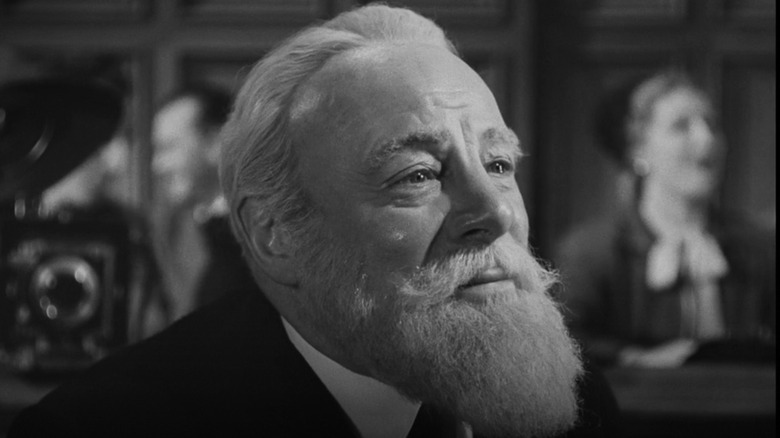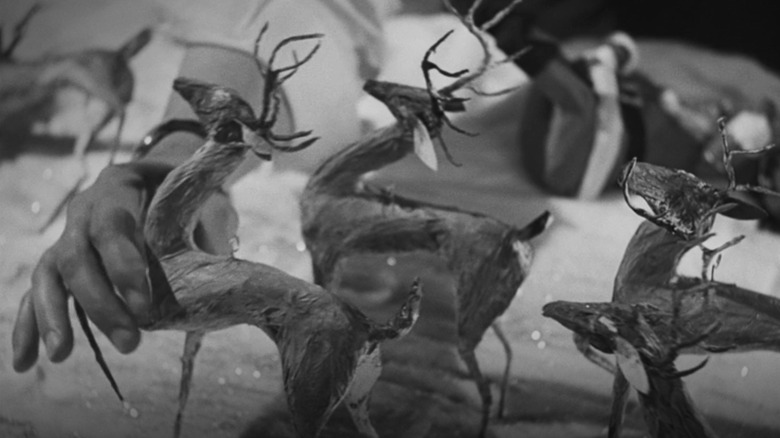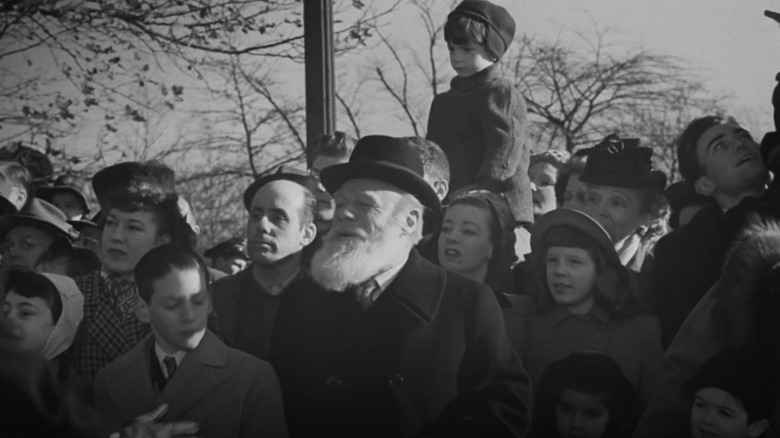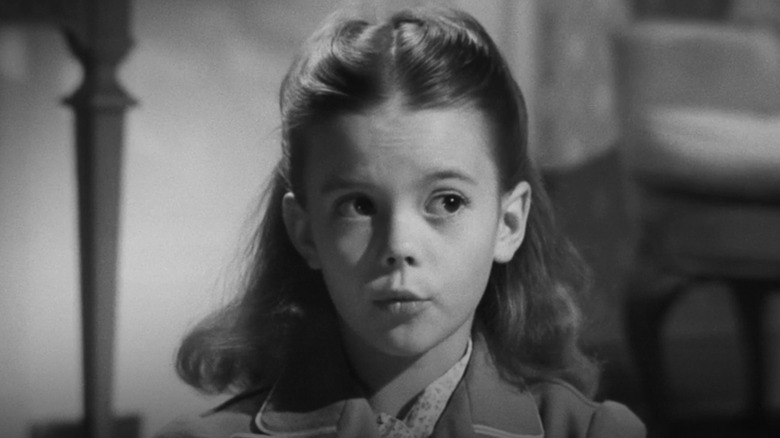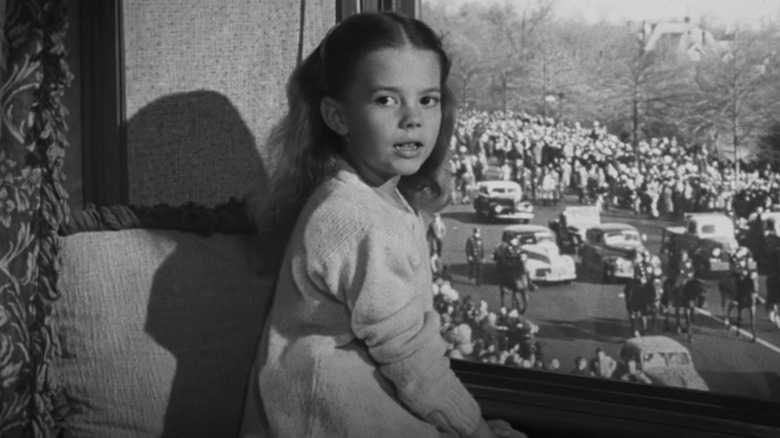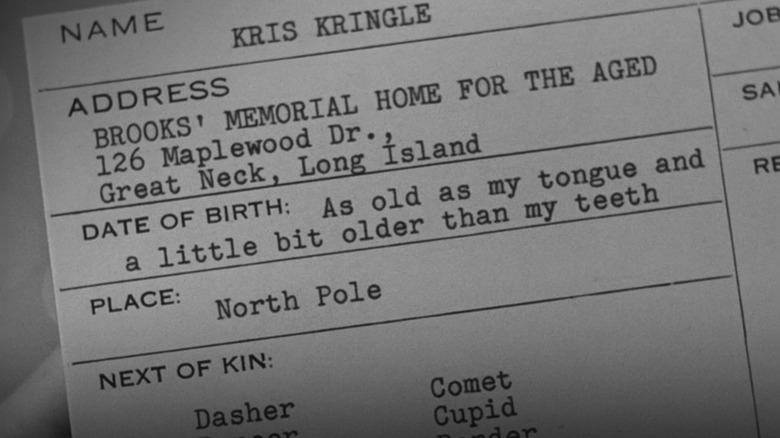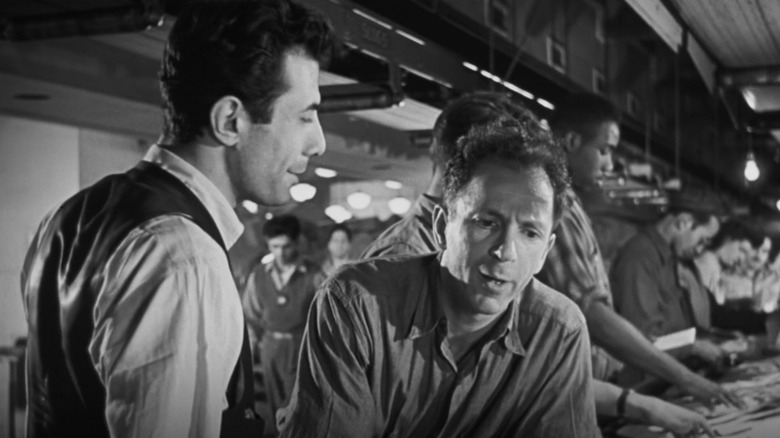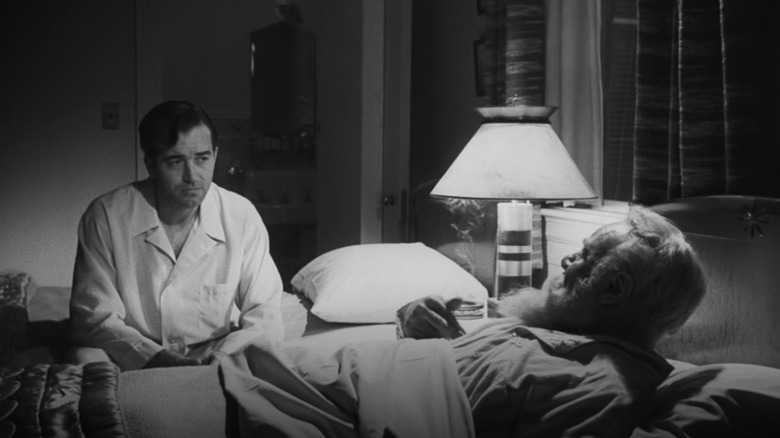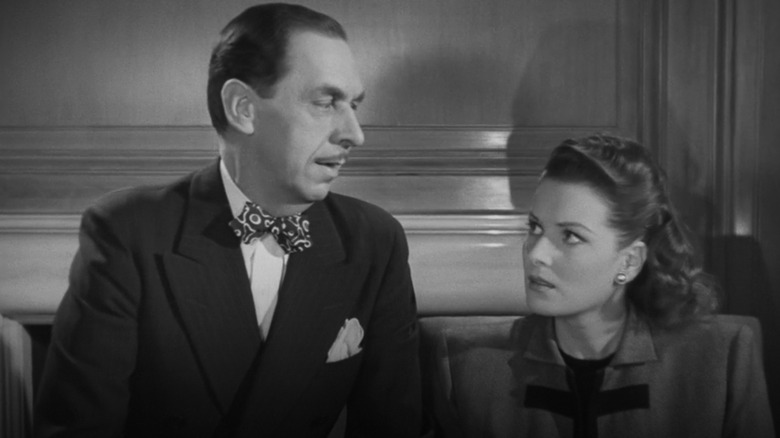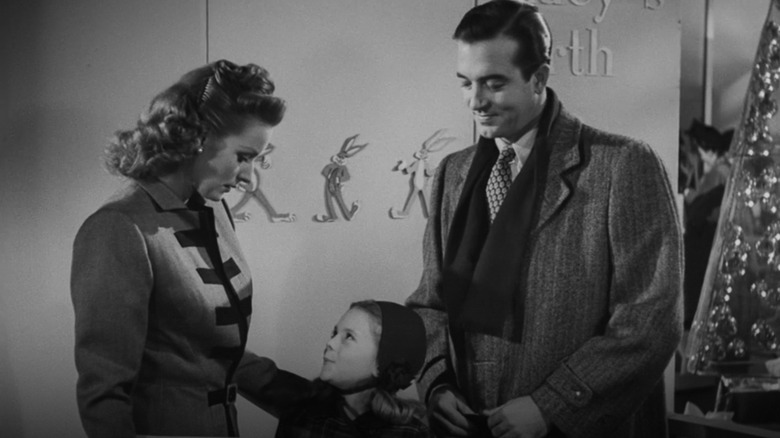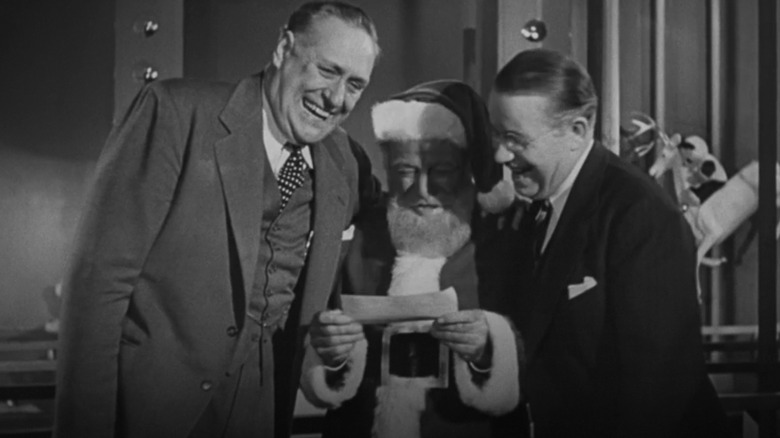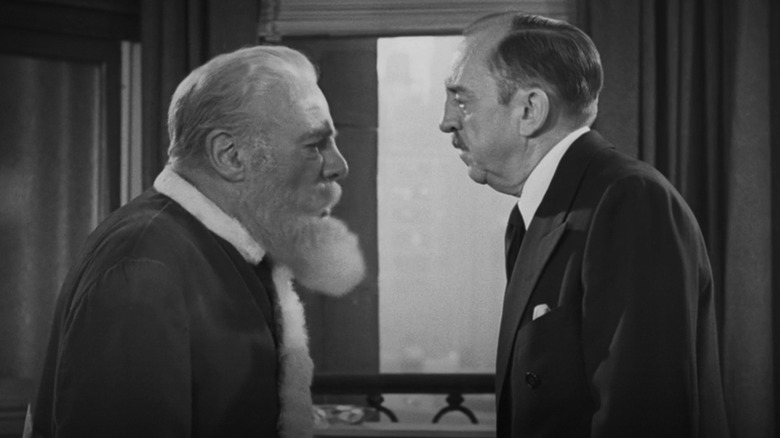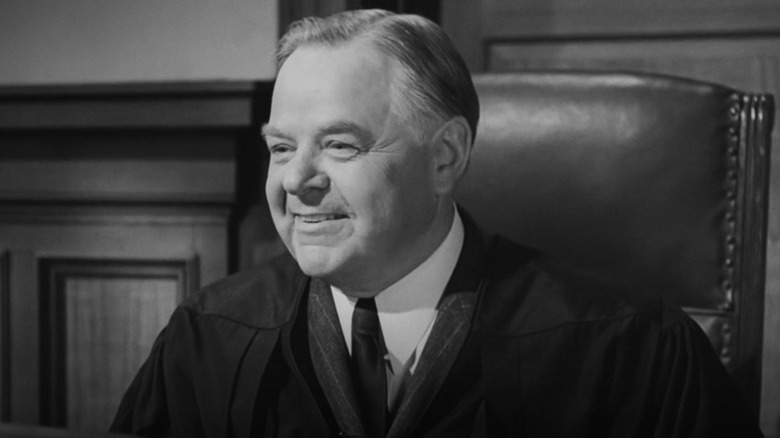Things Only Adults Notice In The Original Miracle On 34th Street
The original "Miracle on 34th Street" is one of our favorite Christmas movies. Whenever the holidays roll around, we're always happy to settle in with this classic. It combines heartfelt feeling and fun storytelling with sophisticated jokes, making it quality family viewing.
Best of all, it's been around since 1947, so we've had a chance to really grow up with it — which means we've had the perfect opportunity to compare how it looked to us when we were kids and how it looks when we revisit it now. We can remember exactly how enchanted we were by this story of how Kris Kringle — who may or may not be the real Santa Claus — gets a job playing Santa in a department store, completely turning people's lives around and bringing everyone back to the generous spirit of Christmas. Now, when we sit down to watch it, we get to relive all that — and notice more than we ever did before. From sophisticated jokes to resonant themes to nitpicks a kid would blow right past, these are the things about "Miracle on 34th Street" that only adults will notice.
The shop window reindeer are a potential clue
"Miracle on 34th Street" leaves most of the interpretation up to the viewer, but if you want to make the argument that Kris Kringle (Edmund Gwenn) isn't the real Santa Claus, one of the best pieces of evidence comes right as he's introduced.
Kris stops to watch a store clerk arrange some decorative tiny reindeer in a shop window, and when he sees that the clerk is setting them up "wrong," he has to make sure to set the matter right. He has strong opinions about where each reindeer should go — which is understandable, if he knows where they usually are on his sleigh. But from an adult perspective, there's no way around the fact that these shop window reindeer are basically identical. There's no way to tell them apart, and there's certainly no way to tell which one represents which real reindeer. Kris even claims that one of them has the wrong number of antlers for the reindeer it's supposed to be... so how is he identifying it at all?
Of course, to a child, the easy answer is magic. Somehow, each of these little decorative reindeer are imbued with the spirit of the real reindeer, just like department store Santas are supposed to be Santa's helpers. From an adult perspective, though, this seems like especially support for the idea that while Kris will always be Santa in our hearts, he might be helped along by a little delusional thinking.
Santa knows when the Christmas season should really start
As we all like to complain, the Christmas season seems to start earlier every year. It would be one thing if the "spirit of Christmas" was steadily taking over the rest of the calendar: If people want to spend more time being generous, compassionate, and jolly, we're all for it. We just can't support hearing Christmas carols on the radio before we've even cleared away the jack-o-lanterns from Halloween. Unfortunately, since a longer Christmas season is good for retail, this trend probably won't stop anytime soon.
But if you want to argue for holding off on decking the halls with boughs of holly, you can get some support from one of the holiday's top authorities: Santa Claus himself. In "Miracle on 34th Street," even Kris Kringle doesn't bother turning up until the Macy's Thanksgiving Day parade. The movie portrays Thanksgiving as the calendar's turning point, letting anticipation for one holiday kick in just as the celebration of another big one is fizzling out. That's when all the decorations start going up, and that's when you need to hire your department store Santa — who just might be the real man in the red suit himself.
Even hardened cynics know Doris isn't doing her daughter any favors
If Doris (Maureen O'Hara) doesn't want Susan (Natalie Wood) growing up believing in Santa Claus, we can understand that: Whether or not to lie to your kids, even in the spirit of fun, is something parents still worry about. But Doris' hardline stance on keeping Susan grounded in the real world goes beyond just raising her as a Santa skeptic. Whether she realizes it or not, she's stunting her daughter's development.
Susan's inability to engage in any kind of imaginative play is already getting in the way of her making friends in their apartment building. Since she can't join the games the other kids are playing, she's excluded and left with only adults for company. Sure, you shouldn't teach your daughter to literally believe she's a monkey, but as Kris quickly proves, there's nothing harmful in teaching her that she can pretend to be one.
We even learn that Doris hasn't been teaching Susan any fairy tales, so she doesn't even recognize a reference to "Jack and the Beanstalk." Doris thinks of fairy tales as the romantic myths that made her fall for the wrong man, but literal fairy tales are a lot more than that, and unless she wants Susan to spend a lot of time being confused by some very basic cultural references, she needs to start teaching her daughter some of history's most famous stories.
Your neighbor won't always be a nice Mr. Gailey
Part of this is an adult perspective, and part of it is just that we've all gotten a lot warier since "Miracle on 34th Street" first came out, but it's hard to watch the movie and not do a double-take when it turns out that Doris' housekeeper, Cleo, just let little Susan watch the parade from a stranger's apartment. Yes, the stranger is the very adorable Fred Gailey (John Payne), and it all turns out just fine, and to be fair, the housekeeper might know Fred well even if Doris doesn't. All the same, most of us wouldn't be thrilled to find out that someone let our child hang out alone with a man we barely knew.
Doris accepts this just fine, however, and she also doesn't have a problem with Fred — now at least an acquaintance, not really more than that — taking Susan out for the day. Meanwhile, we're watching the movie thanking our lucky stars that the Walkers happened to live next to one of the nicest guys around. For a few minutes, this cheerful family Christmas movie reminds us far too much of terrifying true crime documentaries.
Macy's HR department has to go
As far as department stores go, Macy's comes off pretty well in the original "Miracle on 34th Street." Sure, the Christmas season there is hectic and upper management is mostly just concerned with turning a profit and avoiding any scandal, but it has a festive atmosphere and everyone seems happy with their jobs.
It's just amazing that they have those jobs at all, because the Human Resources there is apparently a mess. They presumably had some part in hiring the incompetent Santa Claus who shows up to the job drunk, forcing Doris to find a substitute mere moments before the parade starts. Luckily, Kris Kringle himself is right on hand (you got off easy there, HR). Their interview process is still probably better than their record-keeping, though. When we see Kris', it's one of the best sight gags in the movie — a comedic pile-up of Santa jokes. He's named the reindeer as his next of kin and listed his date of birth as "as old as my tongue and a little bit older than my teeth," which is an apt description of his age in general but certainly doesn't tell anyone when to bring a cake into the office. Clearly nobody was on the ball here. You have to actually read these things, you know, people.
Good things can happen even in a selfish world
"Miracle on 34th Street" is a warm-spirited movie where things tend to turn out right, but it's not naïve. Its Manhattan is chockfull of self-interest, small deceptions, and even outright malice. Despite that, good things still happen — in fact, sometimes they happen as a lucky (or miraculous) result of someone only looking out for themselves.
Why do Macy and Gimbel both wind up doing what's best for their beleaguered shoppers, sending them off to other stores where they can find the right Christmas presents? Because being good turns out to be good business: This bit of Christmas spirit wins people over and makes them loyal customers, so even if they buy one toy somewhere else, they'll come back to Macy's for more. Mr. Macy didn't suddenly embrace the spirit of giving, but things worked out nicely all the same.
That pattern is repeated when the post office workers realize that they can pawn their mountains of Santa letters off on Kris Kringle, currently undergoing a sanity hearing for claiming to be the real Santa. It's a joke and a way to clear up some space in their office, and it winds up playing a decisive role in vindicating Kris and saving the day. It's just part of the magic of the season.
What on earth is going on with Fred Gailey's apartment?
Kris Kringle winds up rooming with Fred Gailey, the good-natured and fun-loving lawyer who lives in the same building as the Walkers. Fred likes shaking up Doris's life and prodding along Susan's developing imagination, so it's not surprising that he wants Kris to stick around.
Fred claims it's an easy offer to make: He lives alone and has twin beds. So we have to ask: why in the world does single man Fred Gailey (a reasonably successful lawyer) have a Manhattan apartment where the bedroom comes with two twin beds? It's not even a guest room situation! This is not a practical way to furnish your apartment, Mr. Gailey.
We can only think of two real reasons for this. The simplest is that the apartment came pre-furnished. It seems unlikely for that particular building, but on the other hand, if these apartments are just generically filled with someone else's furniture choices, it adds even more wistfulness to Susan's longing to escape into a real house. The other possibility is a little racier. Because the Hollywood of the time wouldn't show couples in the same bed, twin beds acted as a kind of cinematic fig leaf assuring you that nothing sexual was going on. Since Fred is Doris's love interest, giving him twin beds in the same room might have prompted 1940s audiences to see the writing on the wall: One day that other bed will have Doris in it.
The movie objects to commercialism... but it's kind of a Macy's commercial
One of the biggest themes in "Miracle on 34th Street" is how even when he's acting as a department store Santa, Kris Kringle transcends any of the commercialism that surrounds Christmas. He doesn't care about drumming up business or making a buck. He just wants to spread kindness and good cheer, and he wants kids in particular to have the happiest Christmas they can.
These are all good lessons, but it's hard not to notice the fact that we're learning them inside a Macy's. As much as "Miracle on 34th Street" insists — correctly — that the spirit of Christmas should rise above the frantic scurrying-around for presents and profit, the movie also builds up a lot of audience good will towards Macy's. Mr. Macy isn't a saint, but he comes across as a good boss. Most of the employees we spend time with are good and likable people. Most of all, the store even does a good enough job providing luxurious pageantry that potentially having a real-life Santa Claus seems to fit right into its winter wonderland atmosphere. It's easy to imagine that when the movie originally came out, kids would want to flock to this store to see where Santa really worked.
Doris gets a little bit of a raw deal
We really like the sweet, low-key romance between the realistic Doris Walker and the playful Fred Gailey, and we're glad that Doris opens her heart to whimsy and the possibility of some Christmas season magic. At the same time, though, we can recognize that Doris' plotline falls into some storytelling traps that are a little annoying.
In essence, even though Doris is a sympathetic character — smart, warm, and full of integrity — everybody runs roughshod over her decisions. She's very clear about the parenting choices she's making with Susan, but no one hesitates to undermine all that when she's not around. (To be clear, we think her hardline stance on imagination and fantasies could hurt Susan in the long run — but it's still iffy for her friends and acquaintances to go behind her back and interfere with how she's raising her child.) She's also saddled with the role of being the stick-in-the-mud who has to be drawn out by Fred, making this an early example of the irritating trope where men are fun-loving and women just need to adopt their point of view.
Luckily, this is a minor complaint, since both the movie in general and Maureen O'Hara in particular still make Doris a complex and compelling character.
What a selection!
"Miracle on 34th Street" possibly features Santa Claus himself coming to work as his department store equivalent, bringing cheer, kindness, and the power of belief to a cynical and jaded Manhattan. Our suspension of disbelief holds up just fine for all of that. What makes us boggle is something just as unlikely but decidedly less magical: the apparent selection the Macy's in this movie offers.
When Kris' policy of sending Macy's shoppers to other stores if that's what it takes to find exactly the Christmas presents they're looking for turns out to be an unexpected boon for publicity, Mr. Macy makes the most of it, and other department stores are eager to hop on board. It even results in a storied handshake between Mr. Macy and his rival Mr. Gimbel, who play up a spirit-of-the-season camaraderie for the press while quietly engaging in frantic one-upmanship. That's where the real jaw-dropper comes in.
Mr. Macy offers Kris a bonus, and Kris says that he really wants to buy the kindly Dr. Pierce a new X-ray machine. It's a little out of his price range, but Gimbel immediately volunteers to make up the difference, and right then and there, Macy claims Kris can buy it through the store (and thus save 10%). We know department stores used to have broader selections, but at what point were they selling high-grade medical supplies?
The fake psychologist is genuinely horrifying
Kids can pick up on how slimy and malicious Granville Sawyer (Porter Hall) is. Even though he's only supposed to be in charge of delivering basic intelligence tests to Macy's employees, he puffs himself up to act like a legitimate psychologist when he clearly doesn't have any real expertise. He lies about Kris and gets him into serious trouble, and he makes poor innocent Alfred feel like there's something wrong with him.
It may take an adult perspective to fully understand Sawyer's creepiness, however. A lot of his banal villainy is about manipulation, and the subtler awfulness of it — and its terrifying potential results — is just easier to pick up on once you're a little older. It's scary enough to think of a complete amateur deciding to authoritatively practice psychiatry, and that's just where Sawyer starts. He then tries to warp Alfred, jumbling the poor kid around by interpreting his kindness and altruism as evidence of something awful lurking in his subconscious and even convincing him that he must hate his father. When Kris confronts him about it — and, admittedly unwisely, escalates to violence — Sawyer doesn't hesitate to lie through his teeth about exactly why Kris hit him, which almost leads to Kris' involuntary committal. That's the kind of nightmarish situation that will really make you shiver, especially when Sawyer is such a petty little man. Adults are well-equipped to understand that it doesn't take a supervillain to do an unbelievable amount of harm.
The courtroom drama is unusually nuanced
One of the nicest touches of "Miracle on 34th Street" is a storytelling approach that's still fairly rare: The courtroom drama doesn't come down to a battle of good versus evil. Sure, we have one side that we want to win, and it's represented by the characters we naturally care more about, but this is still a trial where basically everybody is well-intentioned and just trying to do their job.
Both the judge and the prosecutor are fundamentally nice family men who don't look forward to the task of breaking kids' hearts by proclaiming that Santa Claus is a fake, and the movie even encourages audiences to sympathize with how the judge's political career hangs in the balance. If he rules that Santa is real, then he could be a laughingstock; if he rules that there is no Santa, then he could tank public goodwill and spoil his chances of reelection. One of the best wry jokes in the movie comes when Judge Harper's adviser warns him that if he formally declares against Santa, the only one who will be voting for him in the next election will be the District Attorney. Harper ruefully points out that he won't even have that: "The District Attorney's a Republican."
When the trial finally, decisively wraps up and the post office's evidence proves overwhelming enough for everyone to save face, Judge Harper is just glad to have a way out — and the District Attorney is just anxious to go pick up his son's most wanted Christmas present. Everybody gets a happy ending.
